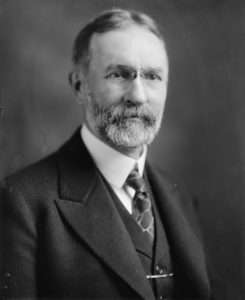The Volokh Conspiracy
Mostly law professors | Sometimes contrarian | Often libertarian | Always independent
Today in Supreme Court History: July 18, 1942
7/18/1942: Justice George Sutherland dies.

Editor's Note: We invite comments and request that they be civil and on-topic. We do not moderate or assume any responsibility for comments, which are owned by the readers who post them. Comments do not represent the views of Reason.com or Reason Foundation. We reserve the right to delete any comment for any reason at any time. Comments may only be edited within 5 minutes of posting. Report abuses.
Please to post comments


The brains of the "four horsemen."
George Sutherland wrote some liberal-friendly civil rights opinions.
He also wrote this in Village of Euclid v. Ambler Reality:
And in this there is no inconsistency, for, while the meaning of constitutional guaranties never varies, the scope of their application must expand or contract to meet the new and different conditions which are constantly coming within the field of their operation. In a changing world, it is impossible that it should be otherwise. But although a degree of elasticity is thus imparted not to the meaning, but to the application of constitutional principles, statutes and ordinances which, after giving due weight to the new conditions, are found clearly not to conform to the Constitution of course must fall.
The opinion also expressed a sensible rule of judicial restraint:
In the realm of constitutional law especially, this Court has perceived the embarrassment which is likely to result from an attempt to formulate rules or decide questions beyond the necessities of the immediate issue. It has preferred to follow the method of a gradual approach to the general by a systematically guarded application and extension of constitutional principles to particular cases as they arise, rather than by out of hand attempts to establish general rules to which future cases must be fitted. This process applies with peculiar force to the solution of questions arising under the due process clause of the Constitution as applied to the exercise of the flexible powers of police, with which we are here concerned.
Justice Sutherland was also the author of a frequently quoted passage regarding prosecutorial misconduct:
Berger v. United States, 295 U.S. 78, 88 (1935).
George Sutherland was the intellectual leader of "the Four Horsemen" and the only one of them generally regarded favorably by legal historians.
The November 1972 issue of the ABA Journal included ratings of the first 96 Supreme Court justices through 1969, just before the appointment of Warren Burger as Chief Justice. A group of sixty-five law school deans and professors of law, political science, and history assigned each justice a grade: A ("great"), B ("near great"), C ("average"), D ("below average"), or E ("failure"). (Why not "F" instead of "E"?)
Only one justice was unanimously declared "great". Of course, that was Chief Justice John Marshall. As for the Four Horsemen, Sutherland was rated "near great". The others - James McReynolds, Willis Van Devanter, and Pierce Butler - were all rated as "failures".
I would highly recommend Hadley Arkes' The Return of George Sutherland: Restoring a Jurisprudence of Natural Rights (1997). It is not so much a biography of Sutherland, but a resume of the natural-rights theory of law that informed Sutherland's jurisprudence.
Albert P. Blaustein & Roy M. Mersky, Rating Supreme Court Justices, 58 A.B.A. J. 1183 (1972). https://www.jstor.org/stable/25726069
I would guess McReynolds was the anus of the Four Horsemen or just the rear end.